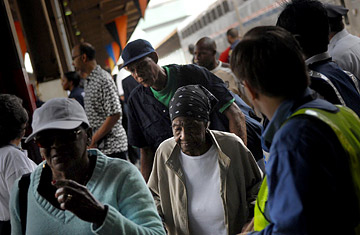
Hundreds of visibly worn down men women and children, young and elderly who evacuated Hurricane Gustav, arrive back at the Union Passenger Terminal in New Orleans, La.
Convincing residents of New Orleans and other parts of Louisiana not to move away after Hurricane Katrina was hard enough. But now the deep-rooted fear left over from that catastrophe may end up giving locals who stayed another reason to permanently depart the Gulf Coast. Even if this storm season doesn't leave as much damage behind, many people are growing tired of hysterical official warnings, cumbersome evacuations and delayed, badly managed returns. Three years later, the area is still haunted by memories of Katrina, and many are starting to wonder how much longer they can take the annual angst-fest.
Only a week after Hurricane Gustav forced nearly two million Louisianans to evacuate, many who fled aren't bothering to unpack as they grapple with the prospect of a powerful new storm, Ike. The category one hurricane has been downgraded to a category one storm and now appears to be headed west of Louisiana toward Galveston, Texas, but that's only partial relief to the weather-weary residents of Louisiana. (See photos of Hurricane Gustav's damage here.)
"I'm just feeling pretty tired," Daryl Dabon, an information technology specialist, said Tuesday from New Orleans' French Quarter. It's the first moment in more than a week she's had a chance to relax. Hurricane Katrina sent six feet of water into her eastern New Orleans home. Last week, she evacuated to Mississippi. Now, the 52-year-old says, "I have big time anxiety whenever I think about Ike."
Even though Louisiana (in addition to Texas) has already declared a state of emergency, government officials must puncture the popular perception that Gustav was a false alarm. That perception is partly driving what's been dubbed "hurricane fatigue," but also complacency: many residents say they won't evacuate for Ike, or future hurricanes. To counter such sentiment, Mark Cooper, director of the Louisiana Governor's Office of Homeland Security and Emergency Preparedness, says, "All we have to do is talk about what happened during Katrina, and they'll realize what needs to be done." Earlier this week, when Ike was projected to hit Louisiana directly, "the governor could have easily said, 'We're going to evacuate.' But we want to make sure it's necessary, to not cause undue angst," Cooper adds.
While the Federal Emergency Management Agency has pledged to eventually pay for some evacuees' temporary housing, many folks cannot afford the up-front-costs of hotels and fuel, much less food. It hasn't helped matters that many of the evacuees encountered overcrowded, dirty makeshift shelters only a week ago. Nevertheless, many Louisiana residents haven't been taking chances. "You can't find a hotel room in Hattiesburg — people booked early," observed Gwen James, a realtor in that south-central Mississippi city, which has become kind of hotspot for evacuees partly because it lies far inland, along Interstate 59. Indeed, hotels from St. Louis to Atlanta have been fielding calls from hurricane-weary Louisianans looking for the refuge they might need — yet again.
Not everyone is just looking for temporary shelter. Since Gustav, Bruce Kammer, a Pearl County, Miss., realtor, says he's received calls from New Orleanians saying, "We've had enough. I want to come up and see what you've got." Lucky for them, in the three years since Katrina, scores of homes have been built. But prices there are often in the $230,000 to $260,000 range — well above the $140,000 to $170,000 similar properties commanded before Katrina. Kammer's selling points include the fact that towns like Picayune and Poplarville, about 50 miles east of New Orleans, are on rolling land — he is hesitant to call it "hills" — about 35 feet above sea level. "Come on up," he's telling prospective buyers pushing for appointments today and tomorrow. Some Louisianans, like New Orleans' Dabon, are looking even farther. "If I could take New Orleans and put it around Montana, I would," she says.
The National Weather Service now projects that Ike, which has just skirted across the Caribbean and is situated atop Cuba's western coast, is most likely bound for Texas, with a possible landfall near Galveston later this week. But even the agency's advisory Tuesday morning warned that such forecasts can be terribly wrong. "Right now, anyone who lives along the Texas-Louisiana coast needs to be prepared for the potential of a major hurricane," warns Walt Zaleski, meteorologist at the National Weather Service's Fort Worth, Texas, office. Ike is expected to gain strength from the Gulf of Mexico's warm waters, and eventually become at least a Category 3 storm — meaning it will carry winds at speeds about 130 m.p.h. (See photos of Hurricane Ike here.)
Much is at stake for the region. Louisiana's post-Gustav recovery has been hobbled by the absence of electrical power in vast swaths of the state, including New Orleans. It's hard to miss supermarket chains' radio ads begging for employees to return: Some workers, mindful that they might soon have to evacuate again, simply aren't bothering to check in with employers.
It's unclear what serious alternatives exist to the kind of painful mass evacuations Louisiana officials ordered last week. A politically tricky situation remains: If state and local officials fail to move residents out of flood-prone areas, they risk charges of incompetence, or worse. But their hesitance after Gustav to allow residents to quickly return to areas that lacked basic services like electricity, grocery stores and gas stations brought the same accusations. In addition, their heightened rhetoric as Gustav approached — New Orleans Mayor Ray Nagin at one point said it could be "the storm of the century" — only hurts their credibility in subsequent potential disasters. The problem is that, while the public needs to be protected, residents face another problem: deciding how many more times they are willing to go through the drill.
